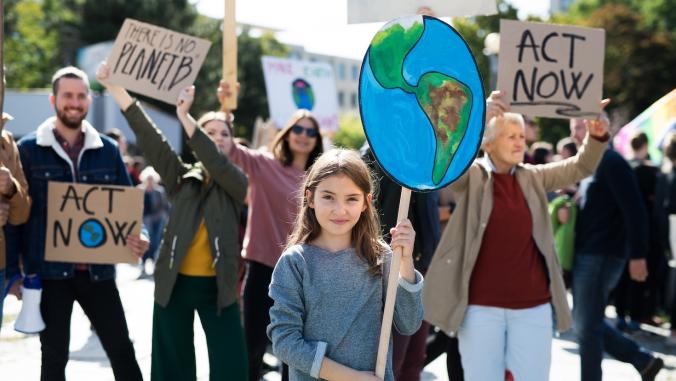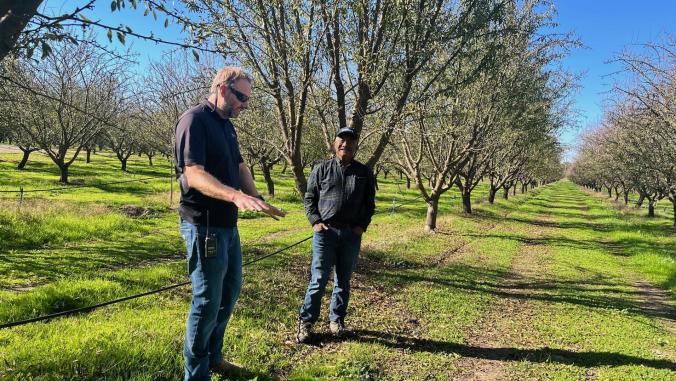Unilever, Nestle, USDA, Rockefeller unite to cut food waste
A group of 30 leaders from business, government and NGOs joined ranks at the World Economic Forum in Davos to halve food waste in 15 years.

The global paradox that a third of all food grown and produced never makes it into people’s mouths — even as 800 million people suffer from hunger — finally may be getting the attention it deserves.
Thirty leaders from business, government and foundations gathered in Davos, Switzerland, for the World Economic Forum vowed Thursday to work to cut food waste in half in the next 15 years.
The participant list reads like a who’s who in environmental and agriculture policy: Tesco, Unilever, Nestle, the World Resources Institute, the Rockefeller Foundation.
The group essentially committed themselves to deliver on one of the United Nations Sustainable Development Goals. Goal No. 12.3 calls for halving per capita food waste by 2030.
Food waste and loss is a $940 billion problem in unrealized revenue to farmers and producers. And, because unharvested or uneaten food rots on fields or in landfills, food waste emits methane in such quantity that rotting food accounts for 8 percent of the globe's greenhouse gas emissions.
If the group succeeds, it will have also helped achieve other lofty goals, such as eradicating world hunger, improving health and mitigating climate change.
The initiative was organized by the World Resources Institute and the Dutch government.
"Any movements for big change have often taken some top level leadership to show that things can be done and keep the discussion on the agenda," WRI’s Craig Hanson, director of global food, forests and water programs, said in an interview with GreenBiz.

In this case the leaders include the presidents of the World Business Council for Sustainable Development, WWF International and the Natural Resources Defense Council as well as those heading Oxfam America, the Rockefeller Foundation. Unilever Chairman Paul Polman, Nestle CEO Paul Bulcke, Royal DSM CEO Feike Sijbesma and Tesco CEO Lewis are involved and Lewis is the chair of the group.
As they announced their coalition, the Rockefeller Foundation launched its commitment of a $130 million campaign called YieldWise around reducing waste during the logistics of moving food from third world farms to markets.
The bigger picture
European Commissioner for Health and Food Safety Vytenis Andriukaitus joined Champions 12.3, as did the ministers for agriculture from the Netherlands, South Africa and Vietnam as well as U.S. Department of Agriculture Secretary Tom Vilsack.
"Our motivation on this came from progress on the Millennium Development Goals, the one in particular 5.1 about reducing maternal mortality," Hanson said.
Success on some of those goals, which outlined the U.N.'s poverty fighting agenda for the first 15 years of the millennium, became a model, particularly the reduction in the death rate in childbirth.
"Between 1990 and 2000 there was hardly a dent in maternal mortality rates," he said. "Then between 2000 and 2015 the rate actually fell by about 50 percent. We asked, why did that happen?"
Food waste and loss is a $940 billion problem.
Judith Rodin, president of the Rockefeller Foundation, added that it will take a coordinated effort to curb food waste.
“Food loss and waste happens all along the global pathway to the plate — from how smallholder farmers harvest and get crops to market, to corporate losses across supply chains, all the way to consumer waste," she said. "To succeed in cutting food waste in half, we must take a systemic approach.”
All CEOs and government ministers and NGO heads that are part of the Champions 12.3 group are committing to some actions, Hanson said, something more than signing their names to a wish list. They've committed to undertaking four specific approaches: to lead by example; to communicate the importance of reducing food loss and waste; to showcase successful strategies; and to advocate for investment, innovation and information sharing on the problem.

Some of their institutions and companies have already been proactive about food waste, in addition to the Rockefeller Foundation. Nestle and other companies have committed to zero waste to landfill by 2020. The WBCSD began a climate smart agriculture campaign.
The government of the Netherlands along with the U.N. Environment Programme, the U.N. Food and Agriculture Organization and the African Union Commission held a major conference on food waste in June to launch the program No More Food to Waste. The idea of Champions 12.3 apparently sprung from the conference.
U.S. Department of Agriculture launched a program a few months ago to raise public awareness of the problem. The World Resources Institute has a Food Loss & Waste Protocol to help organizations measure food waste so that it can then take steps to reduce it.





